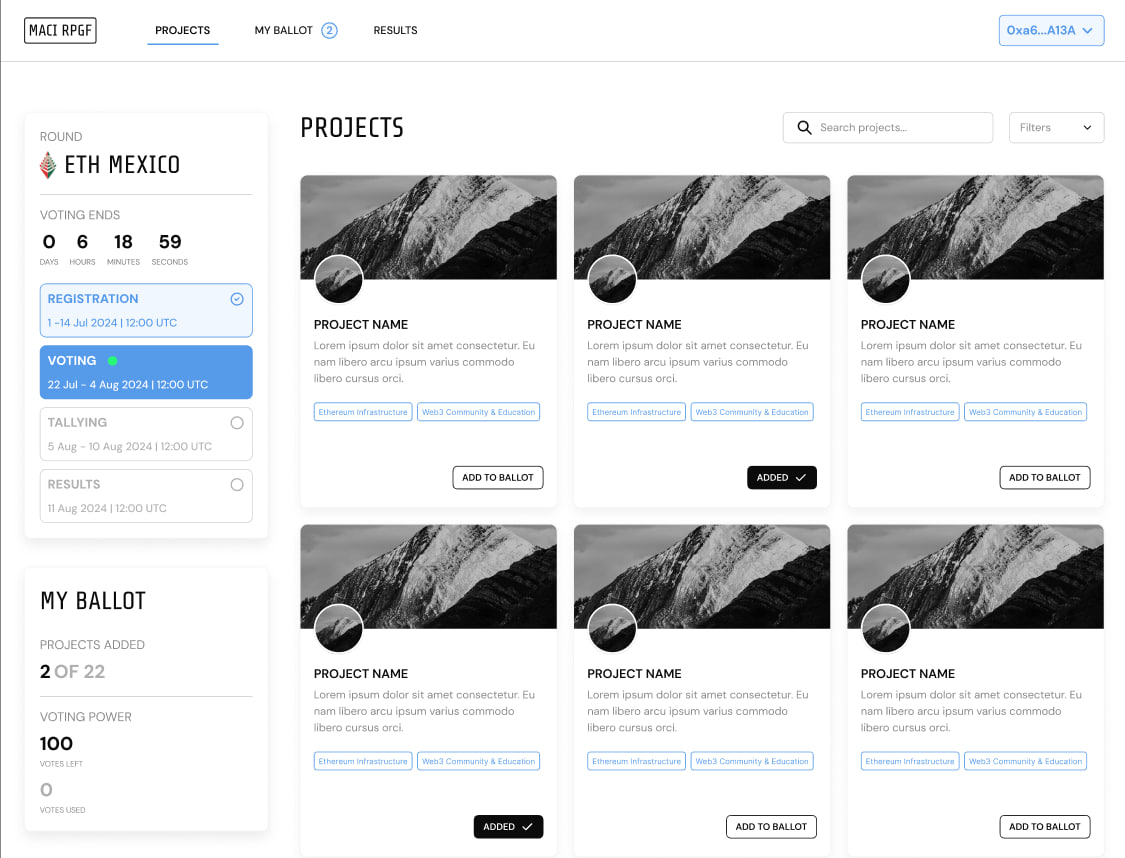MACI v2.0 Release
We are pleased to announce the release of MACI v2.0.0!
This is our second big release of the year, after the MACI v1.2 release in February of this year. MACI v2.0 brings a more secure and efficient protocol, with improved developer experience, and clearer documentation for users looking to learn about and use MACI.
Background
MACI - Minimal Anti-Collusion Infrastructure - is an application that provides privacy and collusion resistance for on-chain voting. If you're new to MACI, we first recommend reading our documentation for background information and technical details.
New Features and improvements
More compact codebase
We have removed some features that were never used in production, namely Topup and Subsidy. This allowed us to reduce the codebase size, making it cheaper to deploy, as well as reducing the complexity of the zk-SNARK circuits.
We highly thank Chao for his work on these two features over the past years, and look forward to integrating similar features in the future as we come up with new use cases and performance improvements.
On top of that, the merkle tree-like structure holding the signups has been swapped out for a more efficient incremental merkle tree (LazyIMT). This offers some savings for users signing up, as well as simplifies the steps required to finalise a poll, by merging all leaves together and removing the need to compute the subroots and root of the tree.
Improved contract tasks
It is now possible to deploy contracts and finalise polls using the contracts tasks only. This makes the protocol much easier to use, as there is no need to use the maci-cli anymore, which often came with a large number of flags and options. You will just need to fill a json file with the correct parameters and run few simple commands.
Concurrent Polls
It is now finally possible to run multiple polls concurrently from a single MACI instance. Users will no longer need to signup again to vote on proposals published by a single organiser. One thing to note is that each poll will have the same amount of voting power, and new users will need to pass the same gating process as existing users.
We believe this feature will work best when used for coordinating several polls for the participants of a single event where signup is gated by the conference ticket and there are multiple voting rounds, like at Devcon or Devconnect.
New Gatekeepers
Custom Gatekeepers are a great way to guard MACI against Sybil attacks, and with this release we have integrated a number of new protocols, together with the help of our community:
For instance, with Gitcoin Passport as the gatekeeper, the MACI round organiser can set a threshold score and only allow new users with a passport score greater or equal to that threshold. Additionally, with Zupass, we can now gate access to holders of specific event tickets.
We expect to continue to expand our gatekeeper capabilities and welcome the community to come up with new and innovative ways to grant access to MACI's rounds, helping make MACI more customizable and sybil-resilient.
Documentation
You gave us the feedback that the MACI documentation was way too tough to digest, and we heard you! To make it easier to understand, we have grouped documentation entries under a more logic structure, with different sections for different audiences and objectives.
We continue to use our docs website as the definitive resource for all information related to MACI, including blog releases, documentation updates, and roadmap progress. As always, we welcome suggestions on how to make it better and encourage you to report any inconsistencies you may find.
Security Audit
As usual before a major release, the protocol has been thoroughly audited by PSE's internal Audit team, and this time no significant issues were found. However, thanks to the auditors' hard work, we have been able to further optimise the protocol and clean up our technical documentation.
For more details on this recent audit, please refer to our audit docs or view the full report.
With more and more eyes on the protocol, we feel more and more confident about MACI's security posture.
Trusted Setup Ceremony
We are preparing for a new ceremony to cover the changes in our v2.0.0 circuits. To accomplish this, we'll leverage the tooling of p0tion, which helps to streamline and automate Groth16 phase2 ceremonies.
We'll update this page after the ceremony completes to include the production-ready zkey artifacts. In the meantime, the artifacts for v.1.2 can be found on our website, and the artifacts can still be used in production for releases 1.2.0 up to 1.2.5.
Get Involved
MACI is deeply committed to our community, through our open initiatives like public roadmaps, transparent repository management, and a public Discord channel for interaction with our team.
With every issue, PR, feature and roadmap iteration, we welcome feedback to ensure that the continued development of MACI reflects your and the community's needs. Keep an eye on our documentation, GitHub discussions and our official Twitter/X account for updates.
For those looking to contribute directly, report bugs, or offer feedback, our GitHub repository is open for issues and discussions. We're eager to assist with your projects or contributions.
For practical implementation insights, review our docs as well as the clr.fund, Allo Stack with MACI, and maci-rpgf repositories as reference implementations. The first two integrations are quadratic funding implementations, a mechanism which otherwise is highly susceptible to collusion and bribery.
For any other questions or feedback, please reach out to us via PSE's Discord, in our #🗳️-maci channel. We're excited to connect and collaborate with you!
References
- MACI GitHub repository
- MACI documentation
- A technical introduction to MACI 1.0 - Kyle Charbonnet
- Minimal anti-collusion infrastructure - Vitalik
- PSE Discord server
- Allo Stack with MACI
- maci-rpgf
- clr.fund
Release
Here's the link to the new release code in GitHub: v2.0.0 Release.

